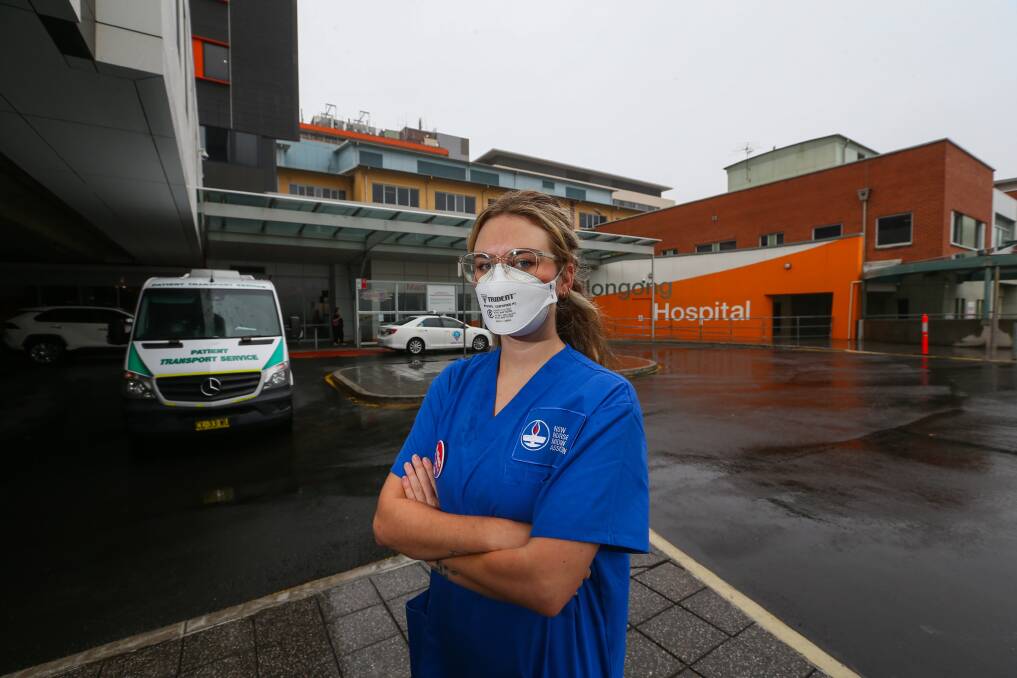
Hospitals are on the "brink of collapse" and nurses are stretched to their limits as the COVID-19 crisis worsens, a Wollongong union representative says.
Subscribe now for unlimited access.
$0/
(min cost $0)
or signup to continue reading
Genevieve Stone, secretary of the NSW Nurses and Midwives' Association's Wollongong Hospital branch, said hospitals were in "bed block" - that is, had no empty beds for new patients - and facing serious nursing staff shortages.
This stands in stark contrast to what the NSW government has repeatedly said about the state of the healthcare system; on Friday, Premier Dominic Perrottet told reporters that while there was "significant pressure", the "health system is strong, we've invested significantly".
But Miss Stone said such comments did not reflect what was happening on the ground.
"Contrary to what politicians are saying, from a nursing perspective hospitals are not coping," Miss Stone said.
Not only was there an influx of COVID patients, she said, but increasing numbers of workers were becoming infected or having to isolate themselves.
She said nurses were working a lot of overtime and double shifts to cover the shortfalls in rosters, receiving text messages daily filled with pleas to help out, especially in critical areas.
Even management were working on the floor in a bid to fill the gaps, she said, and many nurses had not taken leave in over a year.
Miss Stone described nurses forgoing toilet breaks due to their workload, and critical care nurses spending all day on their feet in sweltering PPE.
She told the Mercury that not only were nurses facing longer, harder working hours, but more emotional labour was required of them, too.
Read more: Skipper charged over Bulli boating death
With visitors again barred from hospitals, nurses are providing the emotional and mental support patients would otherwise get from loved ones; this includes palliative patients approaching the end of their lives.
Miss Stone said nurses were concerned about patient care and they continued to plug the gaps as best they could, despite the costs to themselves.
"At the moment we're still maintaining patients care... But we're really struggling, from a nursing perspective, to maintain it," she said.
One Wollongong Hospital nurse reported: "The amount of overtime we're doing is barely keeping the ward afloat".
Miss Stone said the stress was forcing many nurses to leave the profession, drop their hours or move to less critical areas.
"Burnout is at an all-time high," Miss Stone said.
She said the Illawarra Shoalhaven Local Health District's response was "as good as it could be", but the NSW government needed to look at improving funding and recruiting more nurses, including from overseas and agencies.
Nurses had campaigned the government for years going back before the pandemic to increase nurse numbers and boost nurse-to-patient ratios, Miss Stone said, but the government had not met their requests.
"It's a situation that should have been addressed much earlier," Miss Stone said.
NSW Health deputy secretary Susan Pearce said on Friday that modelling suggested hospitalisations in NSW would peak in the third to last week of January, and by mid-February this peak would have passed.
She also said the proportion of cases that converted to hospitalisations was coming down.
The Illawarra Mercury newsroom is funded by our readers. You can subscribe to support our journalism here.
Sign up for breaking news emails below...


